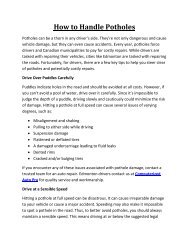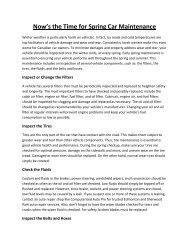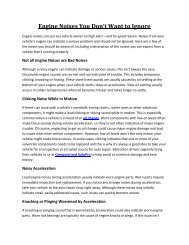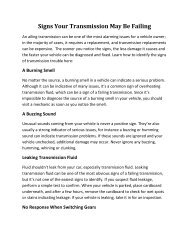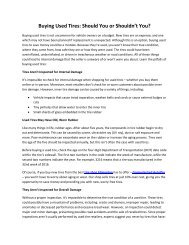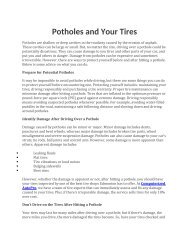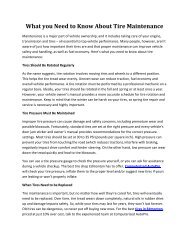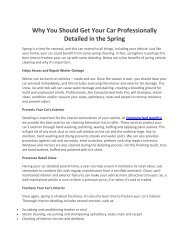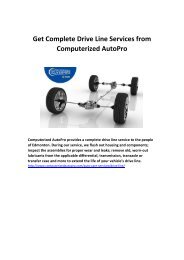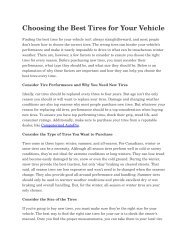All-Season Versus Summer Tires
Check out this comparison of all-season vs summer tires and learn how to choose the right ones for your vehicle.
Check out this comparison of all-season vs summer tires and learn how to choose the right ones for your vehicle.
Create successful ePaper yourself
Turn your PDF publications into a flip-book with our unique Google optimized e-Paper software.
<strong>All</strong>-<strong>Season</strong> <strong>Versus</strong> <strong>Summer</strong> <strong>Tires</strong><br />
<strong>All</strong>-season and summer tires are markedly different. Obviously, one is designed for one season<br />
while the other is designed for all seasons. Choosing between the two depends on your vehicle,<br />
preferences and weather conditions. Although summer tires may work best in the summer, it<br />
may be inconvenient and less cost-effective to switch tires every season. However, both tire<br />
types have strengths and weaknesses. Below is a comparison of the two.<br />
Facts About <strong>Summer</strong> <strong>Tires</strong><br />
<strong>Summer</strong> tires are agile and built to handle high speeds, high heat and extreme dryness or<br />
wetness. Thus, perfect for the heat, dryness and wetness of the summer weather. They’re also<br />
perfect for high performance vehicles. Specialized rubber compounds and tread patterns give<br />
them advanced braking abilities, cornering and responsiveness. Less grooving on the tread<br />
patterns also give them more grip, traction and contact with the road. The tread of these tires is<br />
shallower, offering more flexibility and stability than others. <strong>Summer</strong> tires offer many benefits,<br />
but they don’t perform well in the winter. So, you will need to switch to winter tires between<br />
the seasons.<br />
Facts About <strong>All</strong>-<strong>Season</strong> <strong>Tires</strong><br />
<strong>All</strong>-season tires are all about balance. They provide an average performance in all weather<br />
conditions but aren’t exceptional in any area. For example, while they perform well in the<br />
summer, they have less grip than summer tires. This can decrease a vehicle’s cornering,<br />
steering and braking abilities. On the other hand, all-season tires can perform well in the<br />
winter, but they’re less capable of handling snow, ice and extremely cold temperatures. <strong>All</strong>season<br />
tires’ balanced performance makes them the most suitable for moderate weather<br />
conditions or climates. However, they’re more versatile than summer tires and have a longer<br />
tread life. Versatility and the ability to handle many speed ratings and load capacities make<br />
them suitable for most vehicle types, including trucks, SUVs and mini-vans.<br />
How to Choose the Right Tire<br />
There’s no secret to choosing between all-season and winter tires. The tires you choose this<br />
summer and every other season will depend on what you drive, how you drive and where you<br />
drive. For Canada’s summers, summer or all-season tires are suitable, but you should always<br />
consider switching to snow tires in the winter. No matter which tires you choose, purchase<br />
them from one of the best Edmonton tire shops, Computerized Auto Pro. Come and see our<br />
huge selection of tires – just 10% over cost!




